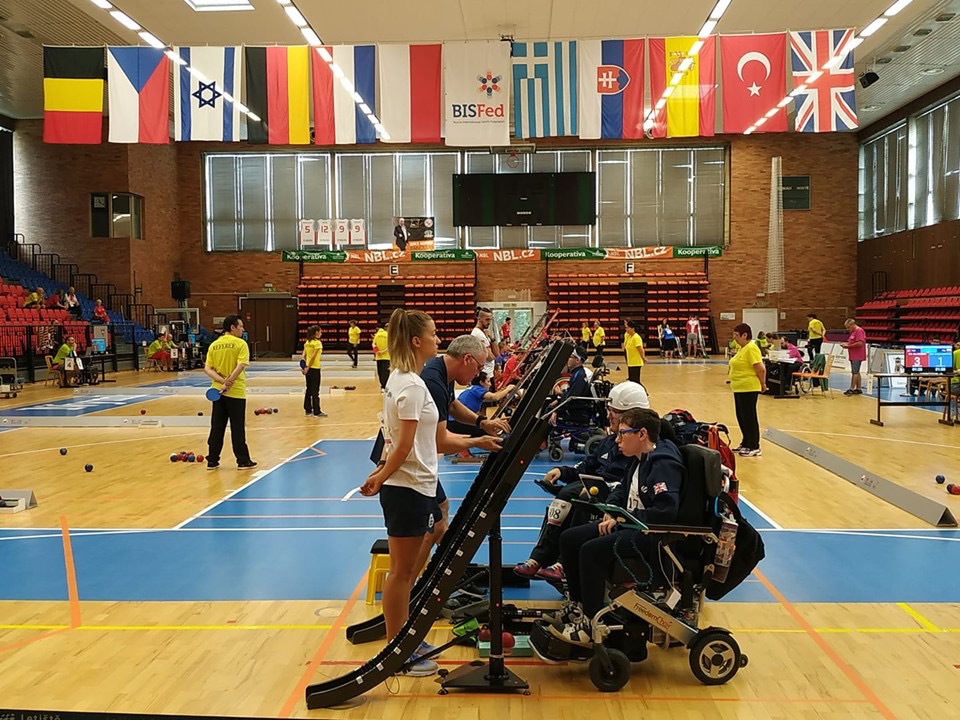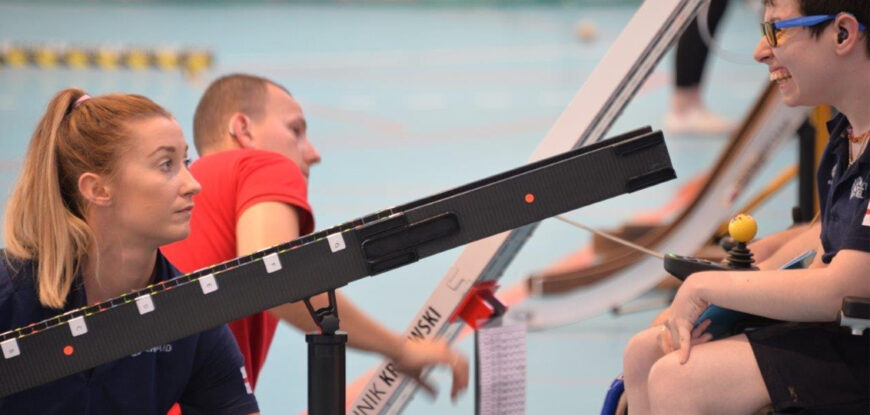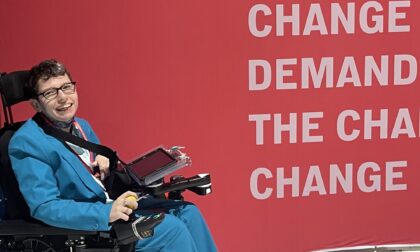Is it right or fair that a woman should be chosen to represent her nation over a male who has a better competitive track record?
Boccia is a mixed gender sport, and definitely in England there are more male players than females. In 2018 the IPC and BISFed decided every boccia team and pair competing, from the beginning of 2020, must have a female play at least one end in every match. I’m not going to discuss the merits of the decision made by higher powers, but I want to explain what this means to me in terms of my boccia journey.
I was over the moon at the start of 2020 to be selected for the BISFed Regional Open in Zagreb at the end of March, and for the World Open in Laval (Canada) in April. Boccia has been my passion since I first started playing at the age of 10, and it’s been my dream to represent GB at the Paralympics for nearly as long. Sadly, for this year with Covid19 our journey has stalled, but hopefully we will be back on court soon.
In the 2017 season I entered my first BC3 regional individual competition and bombed out, playing with a ramp. Not to be deterred I continued to train hard and in 2018 entered the same regional competition, winning and moving up to the national finals of this competition. This led to qualification for the higher level Boccia England Cup national finals where overall I finished 10th in a very strong field, where the majority of athletes have been playing for many years.
In September 2018 I was invited to a UK Boccia Talent Screening camp. From there I began to train with the GB team, initially being invited to each camp expecting it to be my last. In 2019, my first full season at the highest level, I entered the 4 home nation competitions available to me, got to play in the UK Championships with a wild card, and went to Poland with England for my first BC3 international, plus played in 4 UK Challenger events. Every time I played I was (and still am) learning big time. I might be making progress but so is everyone else, the commitment to excel at boccia is immense and most of the top athletes train full time. For me this was all alongside being at Uni full time, this meant juggling training and camps with course work and assessments.

Boccia at an elite level is no different from other sports. I’ve read it takes 10,000 hours or 10 years to go from playing grass roots sport to being on an Olympic/Paralympic platform in any discipline. I may have played for years as a thrower but I’m a relative newbie as a ramp player. From the very beginning of my BC3 journey I knew how lucky I was. I was being given an opportunity most up and coming players would give anything to get, to learn my craft alongside some of the best ranked players in the world. I’ve never been under any illusion that I had this opportunity because of the IPC positively discriminating for female players.
The female place only guarantees one end (quarter of a match) on court in the pairs competition, so in the pool rounds of 3 matches that means a maximum of between 9 and 12 balls in the whole competition. If we were successful in winning a medal then the maximum number of balls I might play across 6 matches could be 18, plus if we were red the jack in our first end. The UK pair is made up of 3 players, 2 males and one female. I guess if the female was a top world ranked player then it might be she would get to play the whole match. The individual places are for the top 2 players from each qualifying pair, so at this stage these go my team mates, unless there are additional slots available dependent on entries. This means without luck on my side, or the faith of the UK Boccia team that I will eventually make it to the top my chances of gaining ranking points is limited just yet.
As part of this learning process UK Boccia entered me into the BISFed Regional Open in Nymburk in September 2019. I was lucky enough to get an individual slot which showed me just what the competition is like outside of training camps and home competition.
My pool included Grigorius Polychronidis (World’s #1) and my team mate, Scott McCowan, who also has a top world ranking. In the pairs I did all the training on and off court and then sat alongside the coach on court discussing each match, absorbing what was needed to take my play into the team game. We won gold, the boys were brilliant, and all in all I had a wonderful learning opportunity that money cannot buy.
When it got to October 2019 I knew if I was to train sufficiently to even be considered for Tokyo 2020 I needed to give more time to boccia, so after a lot of heart searching I arranged to take a year out from uni to focus on training/playing, starting in January 2020. An unexpected turn of events meant I was selected as the female player in the early 2020 UK internationals. I hadn’t gone overnight from being a relatively new and inexperienced player to being a world top player (like my well established team mates), I’d been in the right place at the right time, as they say you must make your own luck! On one hand it would be easy to listen to the people who say that I’m there as a token female player, but on the other hand I know Christie, as my ramp assistant, and I have a vital job to do. We have to go on court, and in the end when I play 3 balls (or 4 if I get the first jack) it’s essential I give my fellow team mates the flying start they need to go on and win each match (no pressure then!). But on the other hand, I know I am serving an apprenticeship for 2024, learning every time I go on court with my ultimate goal being to be on the podium in my own right individually.
I have an opportunity awarded to few, I’m training with 4 of the World’s best BC3 players, only 2 of them can be selected to go with a female to each international. This seems unfair for them but without a female in the team no country cannot enter any competition under international rules.
Meanwhile, the postponement of Tokyo 2020 for a year is a blow for everyone. My heartfelt wish is that everyone, wherever they live, comes through the pandemic safely, the majority of athletes are in the vulnerable groups and shielding. As a squad we are being well looked after by the UKBF staff team. On a personal level I’ve chosen to return to University for my final two terms to complete my degree, this gives me the opportunity to focus fully on boccia from January 2021, exactly back where I started in January 2020 in anticipation of getting to Tokyo.





This is brilliant Beth, such a good piece.
Thanks Kitty